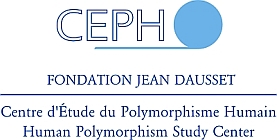Pr Jean Dausset, Prix Nobel de Médecine, 1980
Jean Dausset was born in Toulouse (France) in 1916 and died in Mallorca (Spain) in 2009. In 1980, Professor Jean B. Dausset, shared The Nobel Prize in Physiology or Medicine with Professors George D. Snell and Baruj Benacerraf for his discovery and development of the Human Major Histocompatibility Complex (MHC, also commonly called HLA). Landmark discoveries of Professor Dausset included agglutination of white blood cells by antibodies from patients who had received blood transfusions, which he realized was due to genetic variation, description of the first leukocyte antigen (now known as HLA-2) and of the first tissue group system (Hu-1, later named HLA), and correlation between graft survival and tissue incompatibility, the result of working with volunteer skin donors and recipients. He was active in finding associations of HLA with complex diseases. He was keen on using DNA polymorphisms to characterize HLA. Professors Dausset and E. Carosella collaborated in research into the role of HLA-G in human physiology with implications for immune tolerance in general and pregnancy in particular. Professor Dausset understood the importance of research collaboration and was a dedicated, leading-spirit in the HLA Workshops and Conferences, in which competitors collaborate by typing shared tissue resources. Professor Dausset's research achievements were fundamental for the development of tissue typing, which improved the quality of clinical transplantation. He contributed even more to this field by founding France Transplant and France Greffe de Moelle, organizations dedicated to bringing donor organs and bone marrow to needy recipients in an efficient and rapid manner. In 1984, Professor Dausset created the Centre d'Etude du Polymorphisme Humain (CEPH), a laboratory, later an internationally renowned genome center, which coordinated the first international genome mapping collaboration by making available DNA from 40 large reference families (later 61) to researchers throughout the world. By their working on DNA from the same set of families, it was possible to map the human genome by linkage, which placed a set of DNA markers along all human chromosomes (including the X-Y pseudoautosomal region). Knowledge of these chromosome maps, which was made available to the scientific community worldwide, permitted researchers, some at CEPH, to localize major genes for various genetic disorders to regions of the human genome. Localization of such genes was the first, important step in cloning and identifying them, a breakthrough for medical genetics. Furthermore, the linkage maps provided the foundation for the International Genome Project, the physical mapping of the human genome (largely initiated at CEPH), which in turn led to determination of the DNA sequence. The CEPH reference families continue to be used for genomics research. More recently, Professor Dausset collaborated with Professor L. L. Cavalli-Sforza in developing, at the Foundation, a widely used DNA resource from world populations for research in human population genetics, the HGDP-CEPH Diversity Panel.
In 1993, the CEPH became the Foundation Jean Dausset-CEPH, a non-profit research institute, funded in part by the Republic of France. Professor Dausset retired as President of the Foundation in 2003; he remained honorary President until his death.
Professor Dausset was a member of the French National Academy of Sciences, professor at the College de France, a foreign member of the National Academy of Sciences, USA, an honorary member of the American Academy of Arts and Sciences and a founding member of the Human Genome Organization. He received various prestigious prizes such as the Landsteiner Award and prizes from the Koch and Wolf Foundations. He served on advisory boards of numerous research institutions.
Professor Jean Dausset's Publications |
|
|
| |















